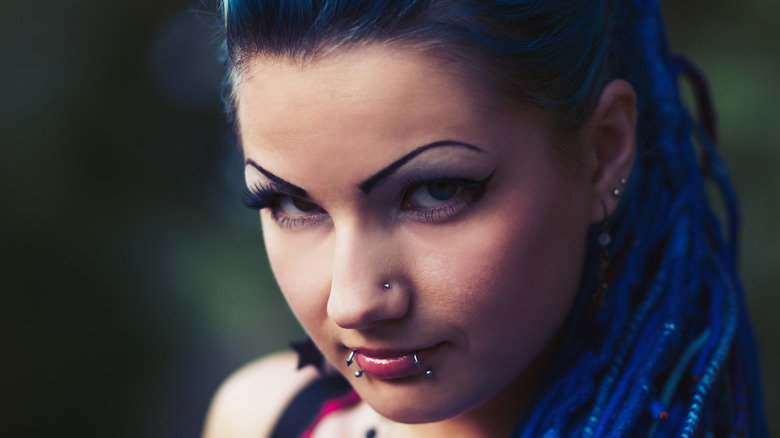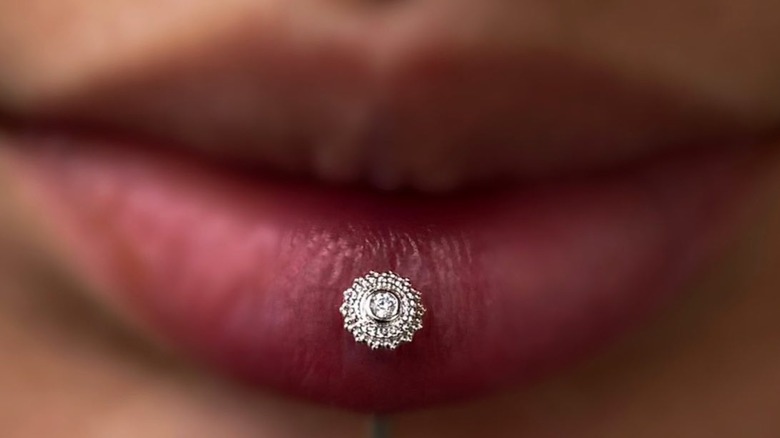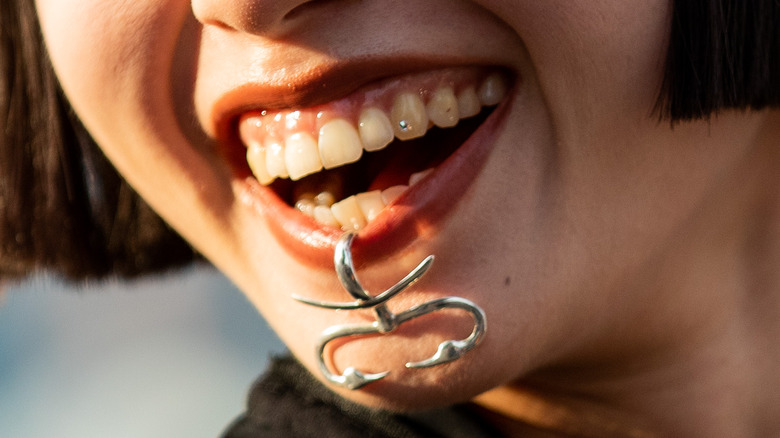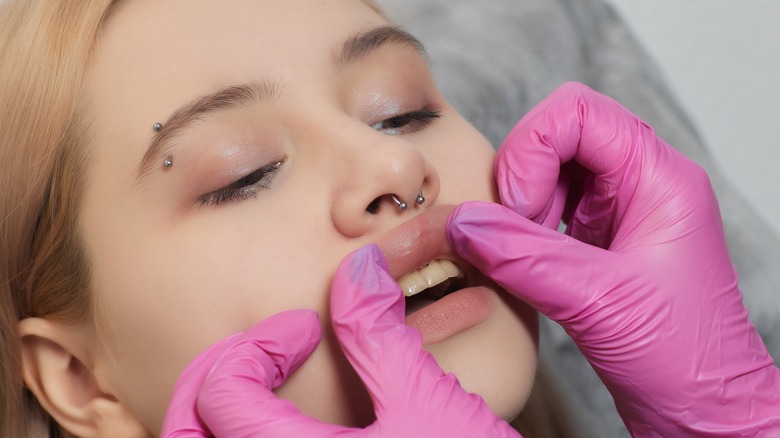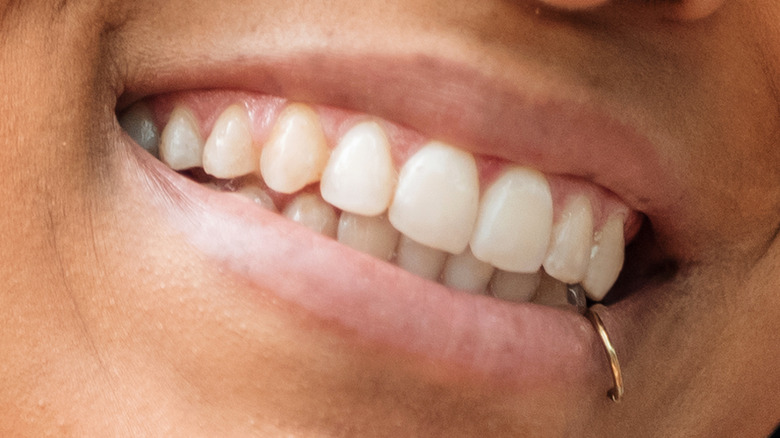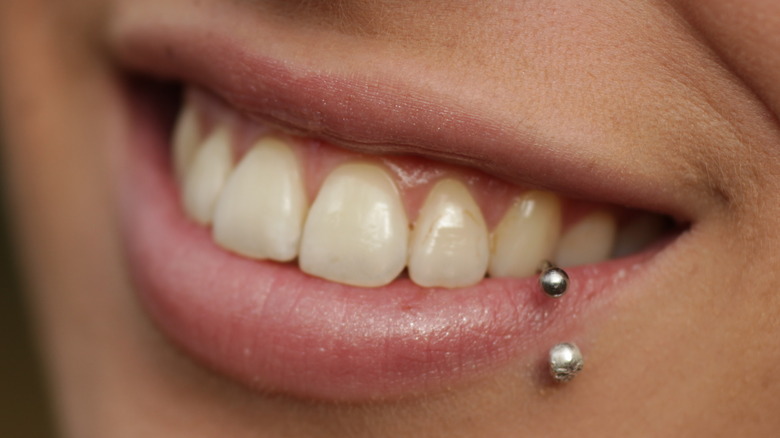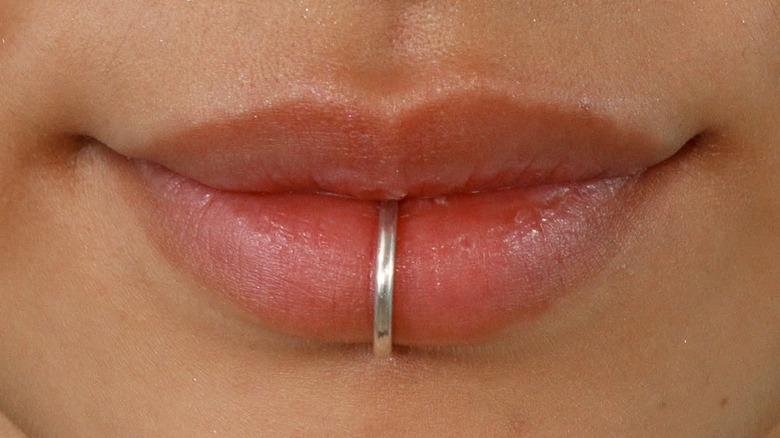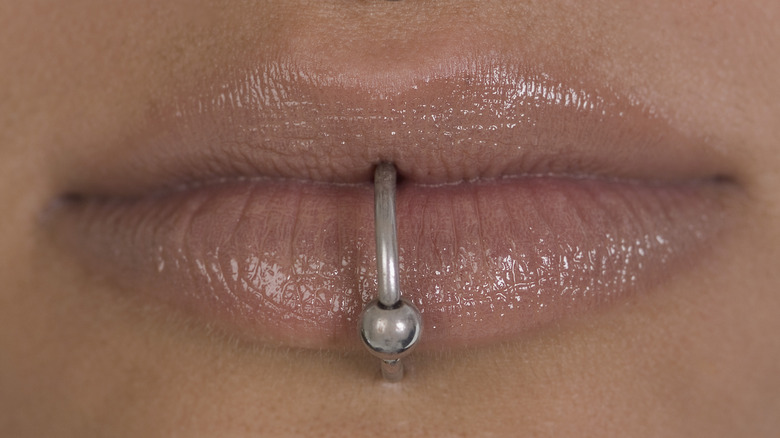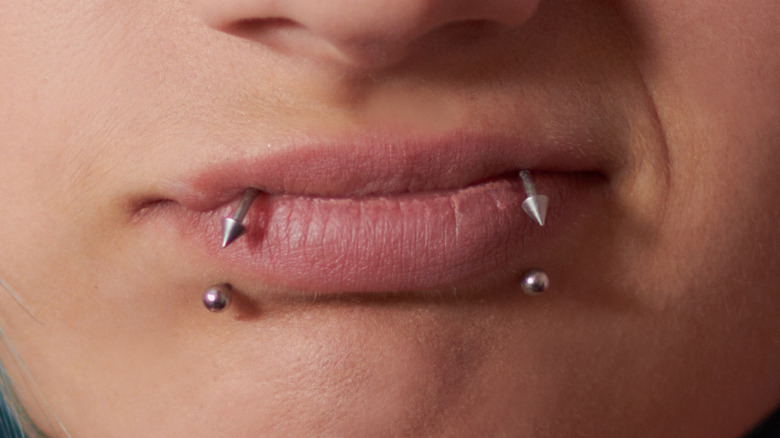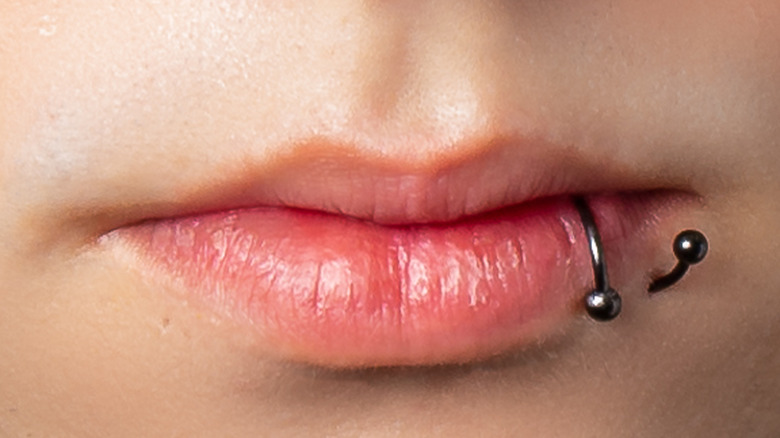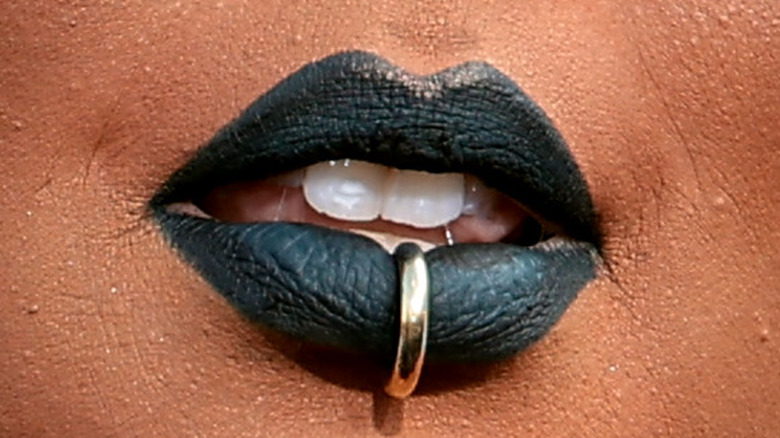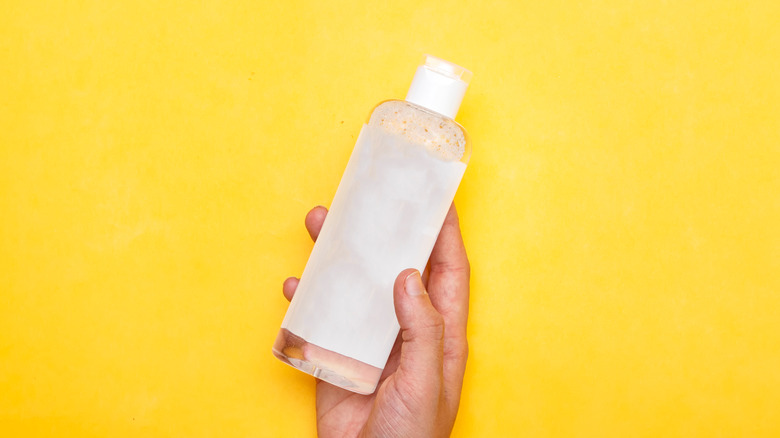Your Most Common Questions About Lip Piercings Answered
Facial piercings are majorly "in" right now, with celebs like Kim Kardashian casually slinging on a fake ring for a red carpet (via E! News). The operative word there, though, is "fake." If you're considering piercing your lip for real, there are many elements to consider, such as the all-important healing process, how painful it's going to be, and of course, what kind of jewelry you want.
As dermatologist Amy J. Derick warned Huff Post, there may be scars or even holes visible, even after the jewelry is removed and regardless of where the piercing is located. Unlike a navel, or even an ear piercing, the scar that remains on your lip after you take the jewelry out is likely going to be pretty visible.
First and foremost, is it even a lip piercing you're after — or a labret? Labret piercings are an entirely different beast, so make sure you know which you want before stepping into a (clean, reputable) piercing shop.
There are different kinds of lip piercings to choose from
The good news is that you have a lot of different types of lip piercings to choose from. According to Pierced, these are the most popular: Monroe and Madonna piercing, which are studs found on opposite sides of the upper lip and named after the famous stars' trademark upper lip moles; snake bite, dolphin bite, dahlia bite, and canine bite, which are different takes on two studs parallel to each other resembling a bite; the Medusa piercing, found between the nose and the upper lip; and the vertical labret, a vertical piercing that goes through the center of the lower lip up until right below the lip.
If you'd like to go against the grain, you're in luck because there are even more types for you to choose from. In total, there are around 16 kinds of lip piercings so take your time narrowing down what fits best for the look you want and your current lifestyle. All the piercing types have varying healing times and complications associated with them, so at the end of the day, it's all a matter of personal preference.
What are the risks of getting your lip pierced?
Getting pierced in any area of your body poses a couple of risks, which is why it's important to have it pierced by someone who knows what they're doing and can get it right the first time. Complications can arise if your piercer doesn't follow health and safety protocols. According to Dr. Mauro Fradeani, diseases such as HIV, Hepatitis, and Herpes can be transmitted through poorly disinfected equipment. Fradeani explained that its effects could be negligible for most but worse for immunocompromised individuals.
Regardless of how experienced your piercer is, one of the major potential risks associated with any kind of piercing is infection. The mouth is exposed to a lot of bacteria from both saliva and food, per Dr. Mariusz Borowicz. It is advised to be diligent with aftercare to avoid any unnecessary complications. But in general, having a lip piercing can pose some risks to your dental and oral health, which is why you must be mindful of your piercing even after it's completely healed. Don't make a habit of fidgeting with your lip piercing — thought it might be tempting. In the long run, it could possibly lead to irreversible teeth and gum damage.
What to expect from your lip piercing appointment
Choosing an experienced and trusted piercer is one of the most integral steps in this process. Go for those who are licensed and have the necessary permits (via the Association of Professional Piercers). You should be able to communicate with them openly every step of the way, and even weeks after your procedure is over, for any concerns.
David Wilkins, a professional body piercer and owner of the Axiom Body Piercing Studio, explained the ideal flow of a lip piercing appointment on his YouTube channel. Wilkins explained that there should be a consultation before the actual procedure begins. During this discussion, you and your piercer should go over what jewelry you plan to use in the long run and whether or not you are an ideal candidate for this type of piercing. Once that is settled, the piercer should disinfect the area and mark the agreed-upon placement so you can check to see if you're happy before proceeding. After all, getting a piercing is still a commitment. Though you can remove it afterward, there can be minimal scarring after it heals.
Does it hurt to get your lip pierced?
Yes, but it'll be bearable, which is good news for anyone who wants to get it but has a low pain tolerance. On the pain scale, it's a 4 or 5 out of 10, per Pierced. The lips' softness makes them easier to pierce through and less painful compared to getting pierced in other body parts (via Infinite Body).
The most pain you're going to feel is during the procedure itself (which is great news since it doesn't last that long). Not so much pain should be experienced afterward provided that you follow proper aftercare and avoid any unnecessary contact with your piercing as it heals — such as biting, tugging, or pulling (via Byrdie). This will definitely be a bit tricky considering how often we use our mouths on a day-to-day basis.
Once the hard part is over, you'll only have to deal with mild discomfort as your skin goes through the healing process. With that, expect the area to remain sore for around six weeks.
How long does it take for a lip piercing to heal?
This is subjective since many factors are at play. Our bodies, lifestyles, and aftercare routines all vary, which affects healing time. According to Piercer David Wilkins, the healing process typically takes around eight to 12 weeks, but it can also reach up to 16 weeks (via YouTube). Wilkins explained that the timeline varies depending on the person and the placement of their piercing. During the first couple of weeks, he recommends avoiding any unnecessary contact with your piercing (tugging, playing with, or biting it) as it can further delay healing.
Patience is important in the healing process. "You're healing a fistula, and that's a tunnel of scar tissue being built around the jewelry, so it takes time" celebrity piercer Brian Keith Thompson explained to Byrdie, adding, "The body's going to seal off the exterior first to prevent bacteria, then it's going to start healing inwards, so it takes a while."
The Association of Professional Piercers advises people with new lip piercings to keep an eye out for any unusual side effects including "fever, chills, nausea, vomiting, dizziness, or disorientation." If this happens, they advise getting in touch with a medical professional as soon as possible.
How much does it cost to get your lip pierced?
It generally costs around $40 excluding jewelry (via Cosmopolitan). The total price of the procedure is affected by the following factors: the location of your piercing studio, the level of skill of your piercer, and the type of jewelry you decide on. It is worth stressing at this point that you shouldn't opt for costume jewelry for a fresh piercing, especially since it's located on your lips.
High-quality materials are the way to go. "Many people have allergies to certain types of metal. It seems obvious, but definitely take into consideration your allergies and select metals accordingly. Stay away from nickel," dermatologist Howard Sobel M.D. explained to Byrdie. It doesn't mean that you have to spend an arm and a leg on your jewelry either, you can always opt for more reasonably priced options. "Surgical-grade stainless steel and implant-grade titanium should cost less than precious metals, like 14-karat gold or platinum," per Cosmopolitan. Sobel also recommends stainless steel since it's the least prone to infection and the body responds well to it as it heals.
Lip piercing aftercare
Successful aftercare takes patience and diligence. While your piercing heals, have a hot and cold compress available for use (via Healthline). Use the hot compress to relieve any discomfort that is felt outside of your piercing, and a cold compress (or ice chips) to relieve any internal pain or swelling.
Due to the placement by the mouth, which is prone to bacteria, you'll need to be mindful of aftercare. Piercer Cozmo Faris told Byrdie that he recommends the use of an alcohol-free mouthwash at least three times daily, especially after eating or drinking. For the outside area of your piercing, Faris recommends a "sterile saline wound wash," which should be left to absorb for at least five seconds before air-drying.
Aside from keeping the area around your piercing clean, you should also try to maintain a healthy lifestyle. Be mindful of your diet and stress levels, and curb bad lifestyle habits, including smoking and drinking alcohol. Certain foods, especially those acidic, spicy, crunchy, and tomato-based, should be avoided so that the swelling doesn't worsen (via YouTube). Your piercing will affect matters in the bedroom both literally and figuratively. Kissing and oral sex is a definite no-no for around eight weeks, per Cosmopolitan. As for sleeping, there won't be much of an issue compared to other piercings (facial or ear) unless you sleep face down. Piercer David Wilkins recommends sleeping with the head elevated to reduce swelling.
What lip piercing jewelry should you wear?
There are two possible windows of opportunity to change out your lip jewelry. Some advise waiting at least six to 10 weeks for the wound to heal before switching (via Byrdie). The second option is to do it two weeks after your piercing appointment (via Cosmopolitan). Initially, the jewelry used by your piercer will be larger to accommodate the swelling, but it must be downsized after. The appointment set two weeks later is when they can shorten it, or alternatively, replace the jewelry completely. "The jewelry has to come entirely out for this process, so this is a great time for you to switch up your look if you decide you don't love your jewelry choice as much as you thought you would," professional piercer Cozmo Faris told Cosmopolitan.
Don't take up the task of changing your piercing on your own. Faris recommends going to a piercing studio. Typically, the jewelry replacement comes with your purchase of new lip bling, or you'll be charged a minimal fee to replace it. But as with any piercing-related matters, it's better to leave it up to someone who knows what they're doing. "Having a studio install it will guarantee it's secure and also the right length and thickness for your piercing," Faris explained. Those that had a post inserted for their initial piercing are in luck! While it's there, you can easily interchange the top, Thompson shared with Byrdie.
Can lip piercings harm your teeth or gums?
Yes, but it isn't very likely. In the case of a lip piercing, there is a likelihood of infection without proper aftercare since the mouth is prone to exposure to bacteria from food and saliva (via Dentists of Hinsdale Lake). Dr. Mariusz Borowicz points out that placement and jewelry choice can put your oral health at risk. The friction from lip jewelry can cause soft tissue, gum, or enamel damage, Borowicz explained. This can be exacerbated if someone plays with their lip piercing often, per Connor Family Dentistry. In more dire cases, gum damage or recession can cause you to lose your teeth (via Somerset Dental).
Chipping of the tooth isn't common, but it is possible when the jewelry is accidentally bit, especially when the piercing is fresh and you have yet to adjust to it (via Painful Pleasures). According to Borcowicz, those with Monroe piercings in particular are more prone to soft tissue injuries. The jewelry has a higher chance of brushing the gums because of its placement on the upper lip.
In any case, it's best to communicate with your piercer if you experience any persisting problems with your jewelry. While you're at it, it wouldn't hurt to check in with your dentist too.
Should anyone not pierce their lips?
Before getting a piercing, it would be wise to assess if it fits your lifestyle. Lip piercings tend to close up quickly upon removal of the jewelry, so if your daily activities or profession requires removing it often, then it might not be worth the trouble (via YouTube). Professional piercer David Wilkins discussed how it could potentially affect your employment. He explained, "If you're working in any kind of profession where you're dealing with the general public ... or professional business people, they're going to frown on this piercing. Depending on what you're planning on doing for a career, this piercing may be a job-stopper in some cases."
It might be best to forego a piercing of any kind if you are undergoing chemotherapy or are currently on medication that makes you more susceptible to infections, such as "anticoagulants, immunosuppressive medication, and some corticosteroids" (via Better Health Channel). Orthodontist Aly Kanani discourages lip piercings for those receiving orthodontic treatment (braces, retainers, Invisalign), as the jewelry could interfere with the process (via Dr. Aly Kanani).
Due to the likelihood of disease transmission, do not get a piercing while pregnant. "The main infections that we worry about with tattoos or piercings ... are hepatitis B or C as well as HIV," Gynecologist Dr. Jaclyn Friedman explained (via She Knows). And if you want to have it done after your pregnancy, it is advised to wait at least three months after labor before getting pierced.
How to clean your lip piercing
Anyone who has had a piercing knows saline solution is your best friend during the healing process. It's better to have one handy in a spray bottle. Store-bought is the way to go for hygienic purposes, per Cosmopolitan. But if saline solution is inaccessible in your area, you can always go the DIY route by making a sea salt solution at home. "Dissolve 18 to 14 teaspoons (.75 to 1.42 grams) of non-iodized (iodine-free), fine grain sea salt into one cup (8 oz. / 250 ml) of warm distilled or bottled water," according to The Association of Professional Piercers.
Your hands should always be clean when you handle your piercing. To clean your piercing, spray the solution on the area and allow it to dry. You can choose to dry it with a paper towel as well, but products such as cotton pads and towels should be avoided since they might leave residue on your piercing. Or worse, the fibers could latch onto your piercing and be difficult or really painful to remove.
Once it's completely healed, all you need to do to keep the external area clean is use a gentle cleanser and wash it down with water (via Byrdie). To top it all off, the Association of Professional Piercers highlights the importance of dental hygiene. They encourage brushing and flossing regularly, accompanied by gargling mouthwash at least two times a day.
